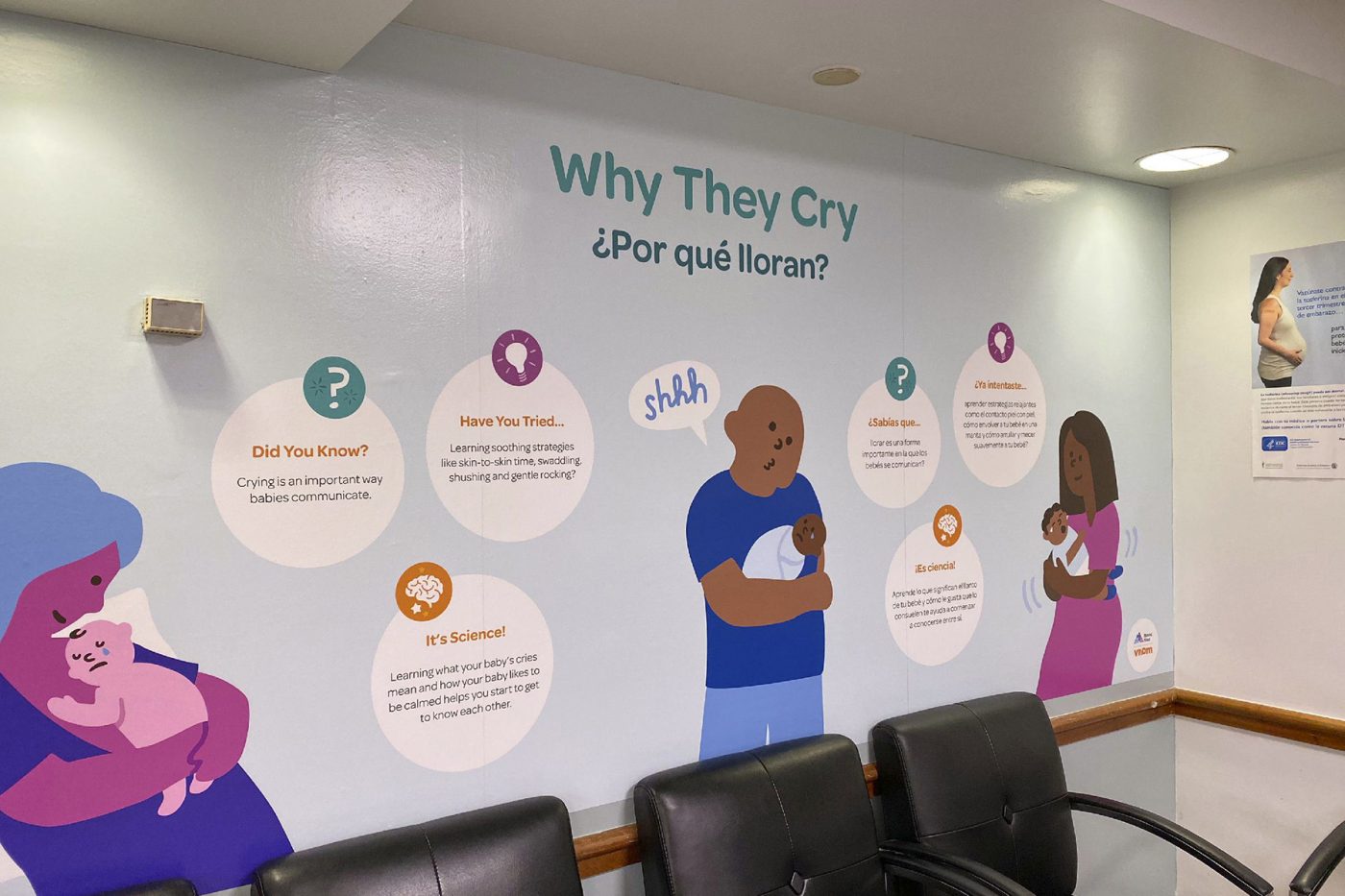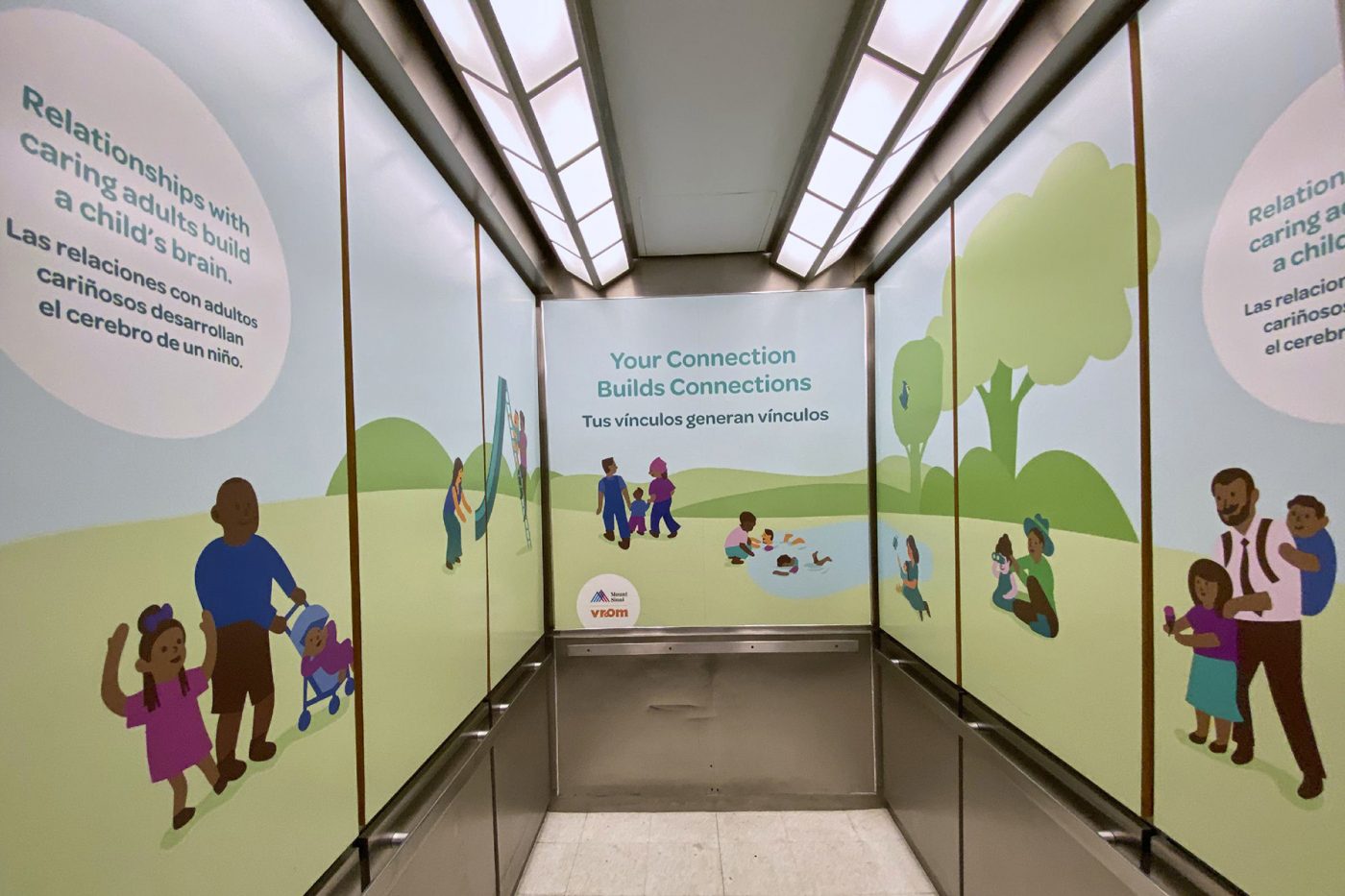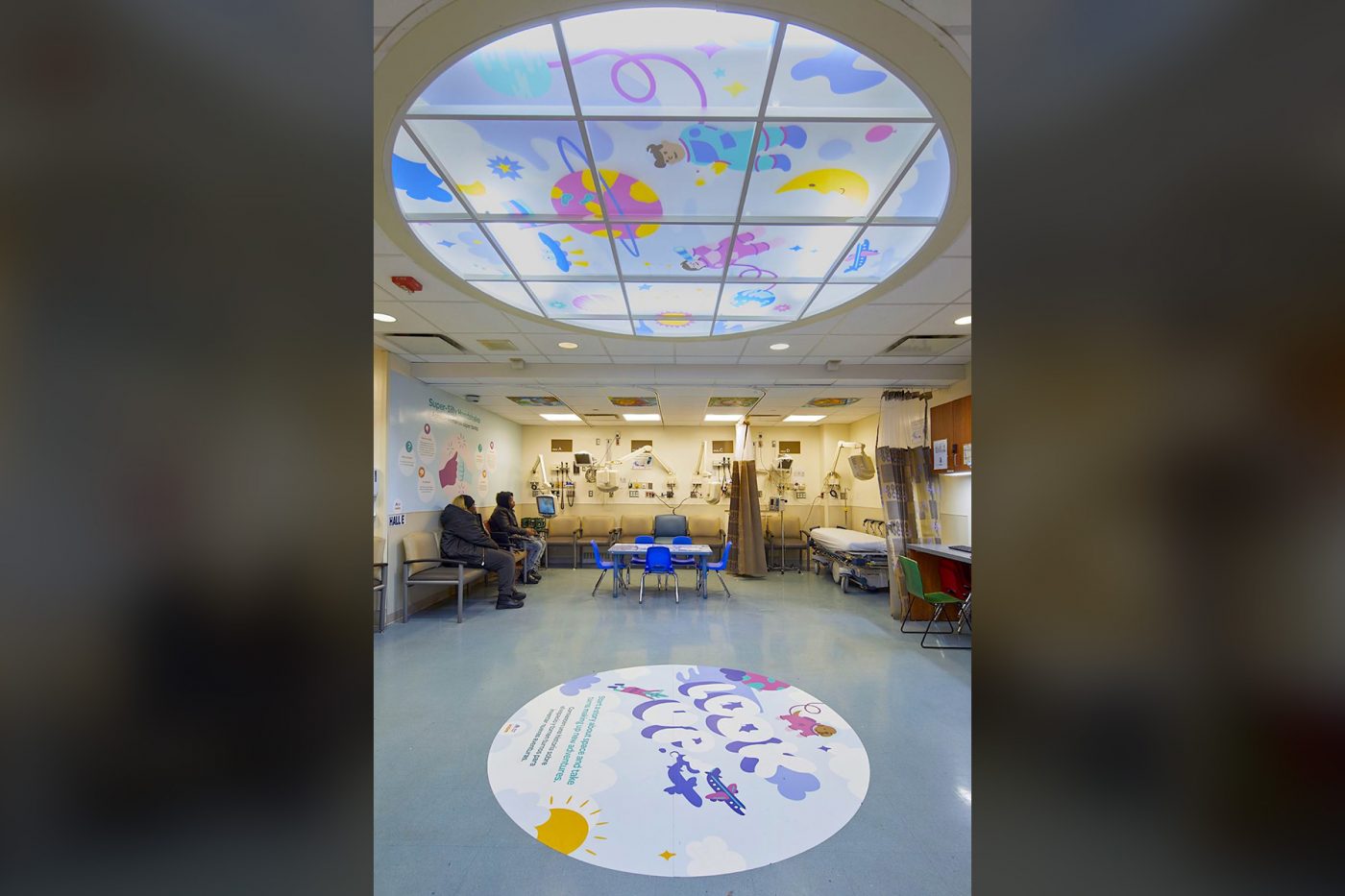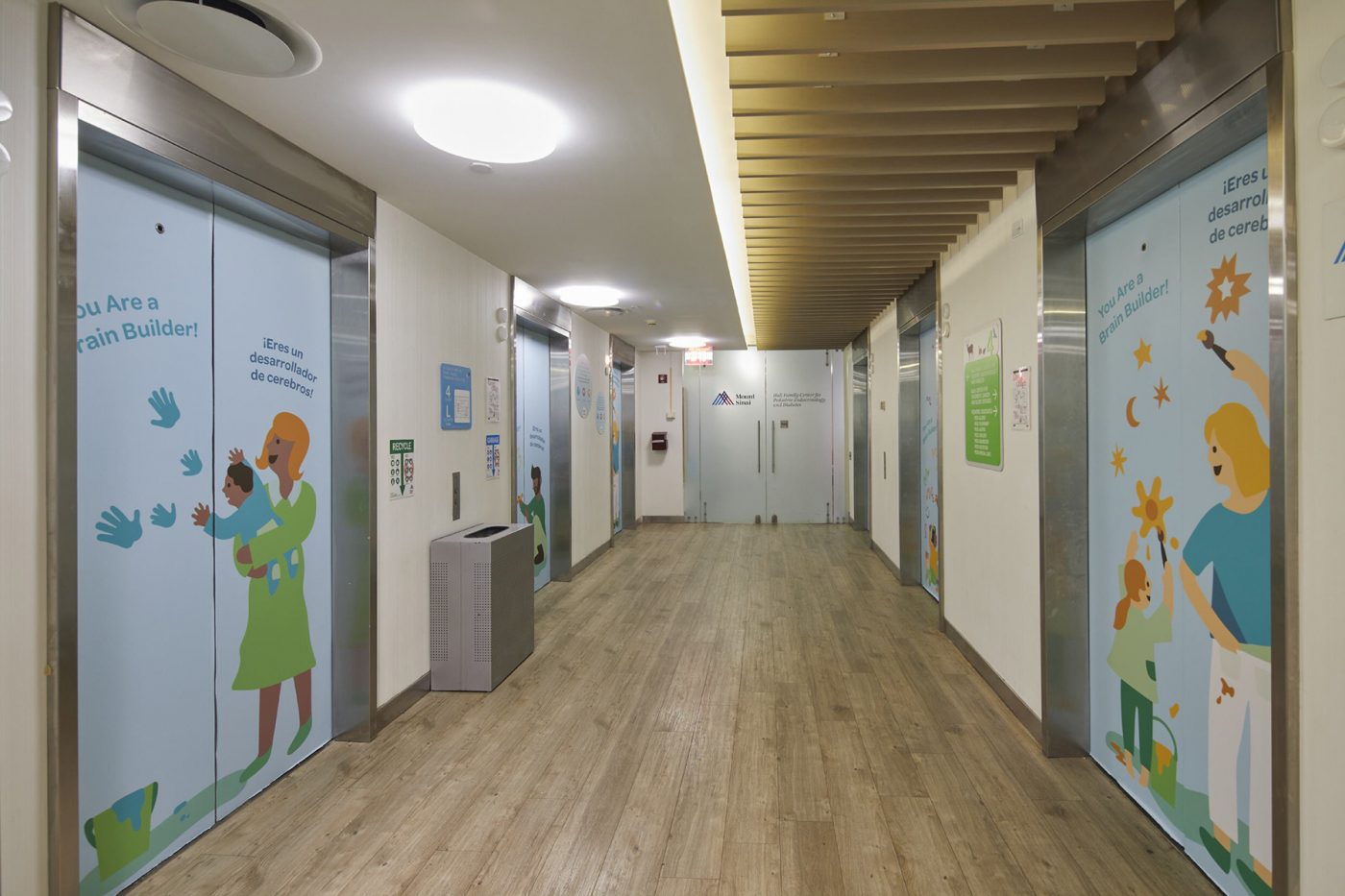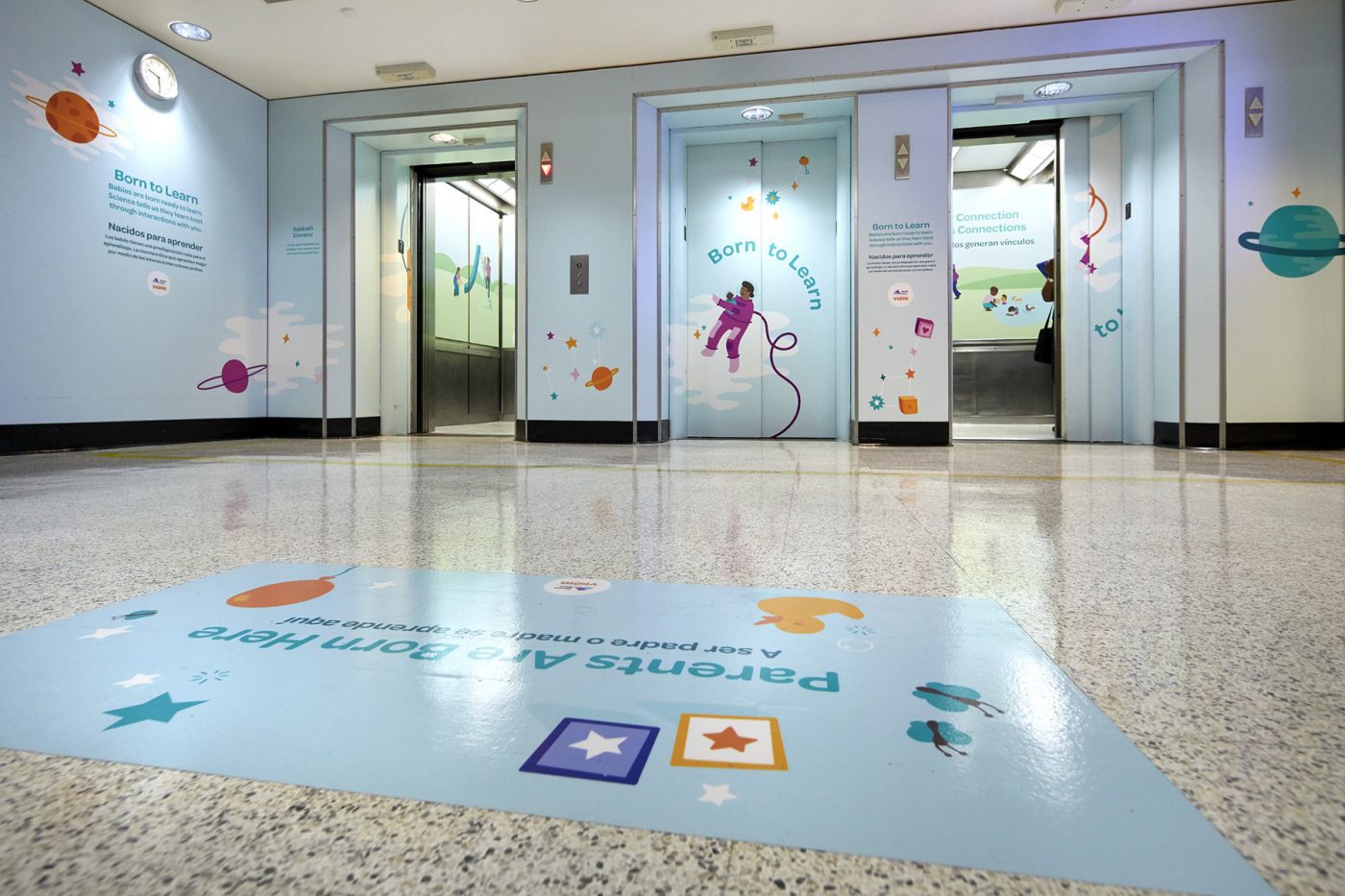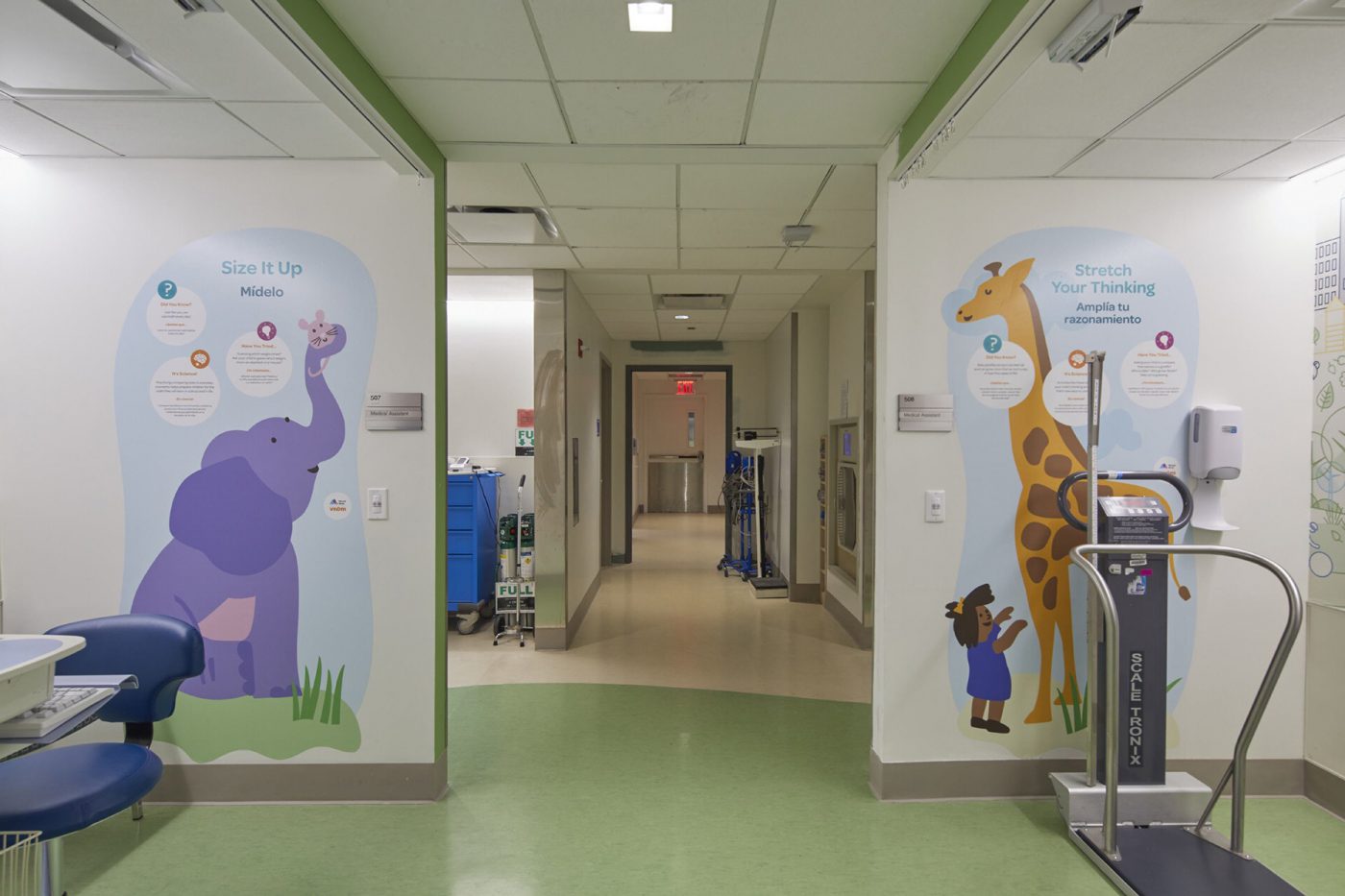Over a few nights in 2019, a radical change took place at New York’s renowned Mount Sinai Kravis Children’s Hospital. As is the case with most overnight sensations, the transformation had been years in the making.
Here’s what happened. While the hospital’s tiny patients slept, a purposeful crew came through with colorful decals, posters, elevator wraps and other materials, transforming the center into a lively, energized space where simple, evidence-based messages offer tips, guidance and support at every touchpoint a family might encounter as they navigate the space. Though the materials for this environmental transformation are eye-catching, their purpose is far from ornamental: They are a dynamic representation of Mount Sinai’s profound commitment to transforming the delivery of pediatric health care itself.
Though the science couldn’t be clearer regarding the difference positive parenting makes for a child’s health and cognitive, social-emotional well-being, pediatricians often have little formal training in child development. An informal survey of graduating pediatric residents reported that most didn’t feel prepared to advise parents on how to foster this healthy development.
“Pediatricians are often asked behavioral questions,” says Ellen Galinsky, president of the Families and Work Institute, a global authority on early childhood and author of the pioneering book Mind in the Making: The Seven Essential Life Skills Every Child Needs. “But because they have very little training in child behavior, they may end up giving advice based on what their own parents did—or just not giving it at all.
“There was an urgent need for them to understand how the child’s mind develops, so in 2012, the Mind in the Making team began collaborating with the Mount Sinai Parenting Center (MSPC) to develop a curriculum that would start at the beginning—by training pediatric residents in the science of children’s brain development as well as how to deliver and model this information.”
The resulting curriculum, Keystones of Development, is a free, online program funded by the Bezos Family Foundation that provides residents with evidence-based research on how parenting behaviors influence a child’s cognitive and social-emotional development, and shows how pediatricians can weave information promoting these positive behaviors into routine well-child visits.
From the start, the Parenting Center’s aim with the Keystones of Development curriculum has been to transform the culture of pediatric practice. It’s hard to argue with the program’s success: From an initial pilot with eight pediatric residencies in 2018, the curriculum has flourished to the degree that it is now used by 82 percent of pediatric residency training programs and 18 percent of family medical residency training programs in the U.S.
Top staff at the MSPC wanted to expand the curriculum’s reach even further. What if a pediatric practice could be set up so that every one of its interactions with a caregiver fosters those parent-child bonds and helps parents realize the difference they make in their child’s development? What if every moment the parent is in the clinic or hospital is rich with messages that provide them with the tools and confidence to be great parents?
The idea of turning everyday moments into brain-building opportunities is at the core of Vroom, a program of the Bezos Family Foundation that puts early brain science to work through tips that help parents boost their child’s learning when they spend time together.
Interviews
Can a shift in a hospital’s culture change professional practice and parent behavior? Learn more about how Mount Sinai and Vroom collaborated to weave early learning into everyday health care moments in underleveraged spaces by brain-building across teams. Read this piece by Sara Billups of the Bezos Family Foundation.
Case Study
Learn details about how the Vroom partnered with Mount Sinai Parenting Center in New York City to reimagine and expand ways to better support families in health care settings through staff training on the science of early learning, program evaluation and the installation of more than 100 science-based messages throughout the hospital. View the Case Study.
To adapt and expand these tips for a health care setting, an interdisciplinary working group was formed to design a pilot project to create Vroom messages for strategic placement throughout the hospital, easily visible to caregivers and staff. The working group included Dr. Blair Hammond and Dr. Aliza Pressman, MSPC’s co-founding directors; Dr. Carrie Quinn, executive director; Mariel Benjamin, director of programs and a licensed clinical social worker, all from Mount Sinai Parenting Center. In addition, the working group included Jackie Bezos, co-founder of the Bezos Family Foundation, Megan Wyatt, the foundation’s managing director of early learning, Ellen Galinsky, and a team from Johannes Leonardo, a leading creative agency based in New York City. Key stakeholders and staff, including physicians, vetted and helped create hundreds of messages unique to six of the Center’s units—the prenatal clinic, labor and delivery, the postpartum unit, the neonatal intensive care unit, the general pediatric practice and the pediatric emergency department.
“The transformation at Mount Sinai showed that small moments add up to a big impact. It helped health care professionals and staff to be better brain builders and we hope it will inspire other health care professionals, too,” said Wyatt.
These vibrant messages did, indeed, transform the hospital’s physical environment. A far more powerful aspect of the pilot project, however, has been a comprehensive training program designed to reach any staff member who might interact with parents, caregivers and children in any of the six hospital units. The center created a video introducing the basic science of early childhood development, then trained 1,123 hospital staff members in a one-hour, in-person lab to apply these key concepts. A month after the training, staff received reinforcing modules and monthly newsletters to maintain the momentum.
“The training has been the most exciting part of the project to me,” Hammond says. “The interprofessional groups—nurses, security, business administrators, lactation consultants, housekeeping, physicians and more—all receiving the same training is something that occurs so rarely. And the recognition in a non-hierarchical way of the role we all play in a family’s experience was just amazing. The content we delivered is so positive that at the end of the training session, people were always smiling and saying how great it was.”
“In the training, we talked about how we see our roles in helping parents fall in love with their children,” Hammond says. “How can we have parents recognize the amazing impact they have on their child? How can we in the health care industry discuss, model, praise and invite positive caregiver-child interactions in our everyday health care moments?”
In determining placement of the Vroom health care messages and where families were most likely to encounter staff, the planning team walked through parents’ process from their very first interaction to the moment they received their discharge information and beyond. (As an expression of its teamwork with new parents, the Center offers online parenting guides for parents and caregivers—brief videos on babies’ development from zero to 5 years with practical, actionable advice on babies’ behavior, parenting questions, tips and resources, and essential information on babies’ growth and development.)
Transformation in the Day-to-Day
The result of the environmental transformation is an immersive experience that leaves no stone unturned in making sure the brain-building messages reach the families and then reach them again.
Hammond says she’s one of the lucky ones at Mount Sinai who gets to experience the transformation as a clinician—seeing the sign in the postpartum unit that says, “Parents are born here,” or in the staff offices that says, “Parents matter here.” She says she’s had families in her office take pictures of messages to share with grandparents, had children ask about the pictures and what people are doing (playing peekaboo or Simon says), and see families in the elevator read the signage that says, “Over a million neural connections are made every second in the brain in the first few years of life,” then download the Vroom app.
Designed to Be Copied
The intention of the pilot project was that it be scalable, adaptable and free to pediatric educators and practices everywhere, with training modules and materials designed to be practical and easily replicated. To that end, Dan Torres, Vroom’s senior program manager, is creating a digital starter kit and accompanying training resources that will be available by the end of the summer for interested organizations. (Contact him at dtorres@bezosfamilyfoundation.org.)
“Mount Sinai did a wonderful job of making the training really accessible in how it can be offered,” Torres says. “It can be in person; it can be virtual. They are experts in the space, and they’ve set it up so that it makes implementation a much easier lift for organizations.”
“Vroom has always been a good, easy fit for home-visiting programs, libraries, child care, Head Start, those kinds of areas,” he says. “Not all children have access to all those things though. If we want to reach as many children as possible, health care settings are where, ideally, children are going to go for well-child visits. This program will be an extra layer that will add a lot of value there.”
For Dr. Sarah Milburn, medical director of the Newborn Nursery at Mount Sinai Kravis Children’s Hospital, one of the program’s greatest accomplishments is the way that it levels the playing field for parents who might never have had any information about childrearing and positive parenting.
“Some families had parents who talked to them, read to them, pointed out things and engaged them in conversation,” she says. “But other parents maybe never have had that demonstrated. Maybe their parents didn’t talk to them, maybe they didn’t grow up around younger children and never saw their parents interacting with a child. Regardless of what was demonstrated for them, we’re demonstrating it now. We’re demonstrating it in what’s on the walls, we’re demonstrating it with how the different staff members interact.
“We may just be in there for a moment, bringing them an ice pack, but we can say, ‘Oh my goodness, the baby has their eyes open. They’re really taking it all in.’ You walk out the door after you’ve handled whatever they needed, but in that split second interaction, you’ve made a difference. And it’s cumulative—all the little conversations they have, all the tips they see everywhere—it all adds up for the family to see how many opportunities they have to interact. They may just be here a few short days, but they’ll take that home with them.”
Milburn says she’s seen the difference in staff as well, in the way they view themselves and how they appreciate their own worth.
“It’s so uplifting,” she says. “Those first few days after you’ve had a baby are so overwhelming and stressful, and having everyone here as part of your team makes such a difference. We always have been part of their team, but I think those interactions when we say, ‘Look what your baby is noticing,’ touch them in a very different way.
“Given what we’ve been dealing with through COVID and everything, it would be easy to feel so worn down from what everyone went through,” Milburn adds. “But spirits are high here and people really appreciate each other.
“This is a really beautiful place to work.”
Resources
- Keystones of Development is a free, online, self-directed program for pediatric residents that demonstrates how they can model and support actions that promote brain development and strengthen parent-child relationships during routine well-child visits.
- Mount Sinai Parenting Center The Center’s Parenting Guides are practical resource that provides parents and caregivers with brief videos on babies’ development from zero to 5 years, offering practical, actionable advice on babies’ behavior, parenting questions, tips and resources, and essential information on babies’ growth and development.
- Vroom translates the science of early brain development into free, easy-to-use tips for parents and caregivers. By turning everyday moments into brain-building moments, Vroom reminds parents and caregivers that they already have what it takes to give kids a great start in life. The Vroom app, Vroom by Text and printable materials deliver more than 1,000 interactive tips caregivers can use to support early learning.
- Mind in the Making is a program of the Families and Work Institute that curates the science of children’s brain development and learning, shares it with the public, families and professionals, and translates this research into transformational in-depth training and materials. MITM’s Learning Modules, Skill-Building Opportunities and Book Tips serve professionals and caregivers across a wide array of sectors with a two-generational approach to building executive function-based life skills with children and families.
- Academic Pediatrics: Evaluation of Keystones of Development
To Learn More about Vroom Health Care, contact Dan Torres; Vroom Senior Program Manager; dtorres@bezosfamilyfoundation.org

K.C. Compton
K.C. Compton worked as a reporter, editor and columnist for newspapers throughout the Rocky Mountain region for 20 years before moving to the Kansas City area as an editor for Mother Earth News. She has been in Seattle since 2016, enjoying life as a freelance and contract writer and editor.









